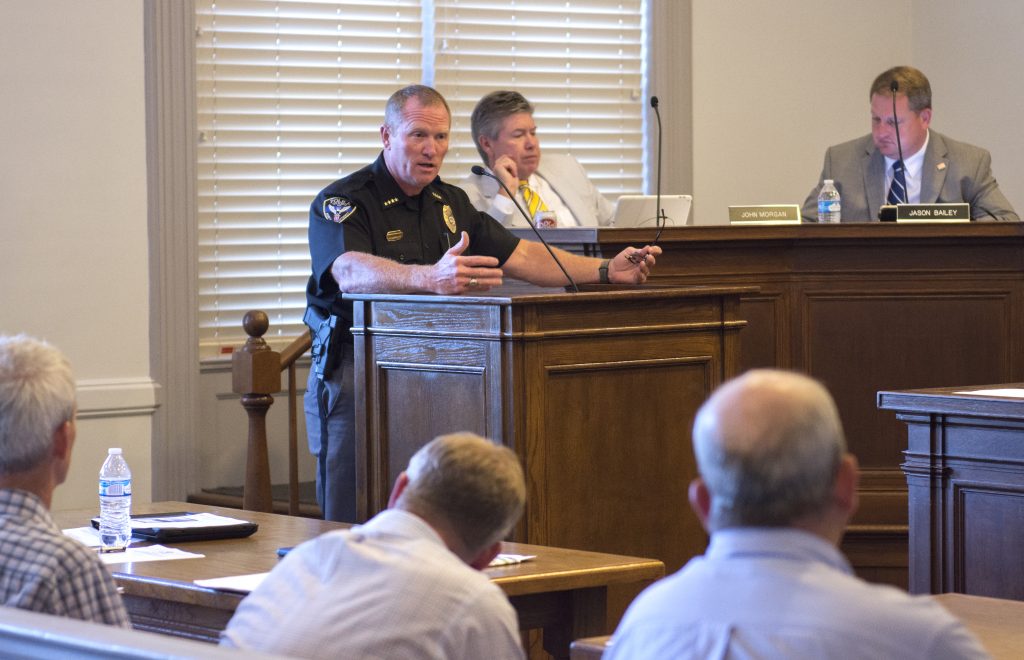The Oxford Board of Aldermen unanimously passed the “Alcohol and Safety” ordinance Tuesday night, which will require students to scan their IDs to enter bars, will require sororities and fraternities to rent out venues with adequate security and will force businesses to install cameras on the interiors of their buildings.

Oxford Police Chief Joey East speaks after the Board of Aldermen unanimously passed the Alcohol and Safety Ordinance on Tuesday. Photo by Christian Johnson
The ordinance will go into effect in 30 days, but at that point will only apply to the businesses located within the original “Downtown District” boundaries, which are all businesses located on the Square. The ordinance will then be applied to the rest of the city on Jan. 1, 2019.
The aldermen delayed the vote at their last meeting, citing substantive unread emails from citizens regarding the ordinance. Since the ordinance’s introduction in June, the vote has come under increased scrutiny from citizens and business owners who said the ordinance had a racial bias and promoted a message of exclusivity.
Dee Hobbs, the attorney for The Lyric, said he was “surprised” by the decision of the city to only make the law applicable to bars in the defined downtown area for the first period of time, and he’s prepared to pursue legal action.
“We are prepared to pursue any and all acts of legal remedies available,” Hobbs said. “They gave no rational distinction between the bars on the Square versus the bars in the rest of the city.”
After months of the city denying that the ordinance was a response to the shooting at The Lyric, Oxford Police Chief Joey East responded to criticism and refuted statements claimed by The Lyric Oxford. East said The Lyric claimed that the April 27 shooting was caused by an “uninvited guest that entered the event venue through the back door.”
“The reason they know that person came in the backdoor was because we told them he came through the backdoor,” East said. “What they’re not telling you is this person was not an uninvited guest — this person was an invited guest that was on the VIP list.”
East also said he “took offense” to allegations that ordinance has a racial motivation and said the ordinance does not have a racial bias. He also took time to say that going forward, the ordinance requires a partnership among businesses and the city to properly implement the new security measures.
Oxford Mayor Robyn Tannehill agreed with East and thanked him for his work on the ordinance.

The Oxford Board of Aldermen unanimously implement the Alcohol and Safety Ordinance on Tuesday. Photo by Christian Johnson
“I appreciate your commitment to this community and your commitment to the partnerships,” Tannehill said. “I believe this is a discussion about alcohol. And it’s turned into a discussion about a lot of other things, but it’s all about public safety.”
The only major change to the passed ordinance was made at a previous Aldermen meeting on August 21. Then, Aldermen removed the requirement that The Lyric pay a $75 permitting fee every time it hosted an event.
Alderman Rick Addy also addressed concerns that requiring businesses to install security cameras would place a burden on businesses. He said the cameras would not be that expensive for the businesses.
“Eight or six cameras can go anywhere from $350 to $1,000,” Addy said.
The Lyric Oxford owner Bradley Bishop could not be reached for comment.






